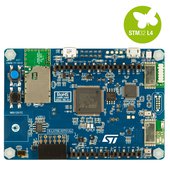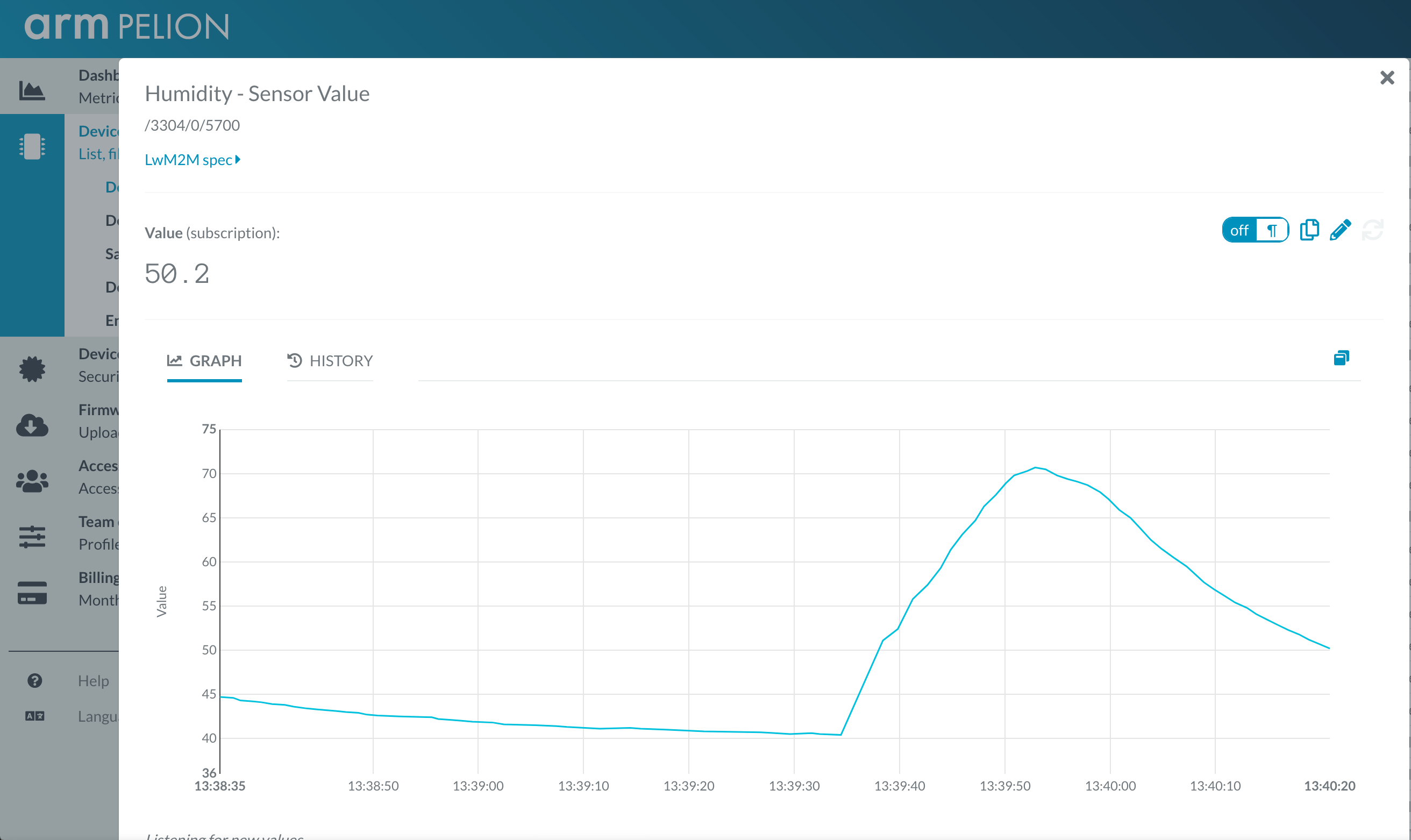Mbed OS and Pelion Device Management example over WIFI for DISCO_L475VG_IOT01 board
Dependencies: X_NUCLEO_COMMON ST_INTERFACES
DEPRECATED
This example application is not maintained and not recommended. It uses an old version of Mbed OS, Pelion DM and Arm toolchain. It doesn't work with Mbed Studio.
Please use: https://os.mbed.com/teams/mbed-os-examples/code/mbed-os-example-pelion/
This example is known to work on the following platforms:
- DISCO_L475E_IOT01A over WiFI and using onboard QSPI flash.

Follow the Quick-Start instructions: https://cloud.mbed.com/quick-start
Example functionality
This example showcases the following device functionality:
- Read onboard temperature and humidity sensors, and report them as Pelion LWM2M resources (see image below).
- On user button click, increment Pelion LWM2M button resource.
- Allow the user to change the state of the board LED from Pelion LWM2M led_state resource and PUT request.
- Uses all onboard sensors and reports them as Pelion LWM2M resources.

Use this example with Mbed CLI
1. Import the application into your desktop:
mbed import https://os.mbed.com/teams/ST/code/pelion-example-disco-iot01 cd pelion-example-disco-iot01
2. Install the CLOUD_SDK_API_KEY
mbed config -G CLOUD_SDK_API_KEY <PELION_DM_API_KEY>
For instructions on how to generate your API key, please see the documentation.
3. Initialize firmware credentials (done once per repository). You can use the following command:
mbed dm init -d "<your company name in Pelion DM>" --model-name "<product model identifier>" -q --force
If above command do not work for your Mbed CLI, please consider upgrading Mbed CLI to version 1.8.x or above.
4. Compile and program:
mbed compile -t <toolchain> -m DISCO_L475VG_IOT01A
(supported toolchains : GCC_ARM / ARM / IAR)
5. You can connect on a virtual terminal/COM port to the platform using:
mbed sterm -b 115200
This should give you an output similar to:
[BOOT] Mbed Bootloader [BOOT] ARM: 00000000000000000000 [BOOT] OEM: 00000000000000000000 [BOOT] Layout: 0 80096F4 [BOOT] Active firmware integrity check: [BOOT] SHA256: 0660E360D432225D5251461998FD8617B017098C5F1F90D5FB607BF8C27ED530 [BOOT] Version: 1553615309 [BOOT] Slot 0 is empty [BOOT] Active firmware up-to-date [BOOT] Application's start address: 0x8010400 [BOOT] Application's jump address: 0x8011041 [BOOT] Application's stack address: 0x20018000 [BOOT] Forwarding to application... Starting Simple Pelion Device Management Client example You can hold the user button during boot to format the storage and change the device identity. Sensors configuration: Invalid new address! HTS221 humidity & temperature = 0xBC LPS22HB pressure & temperature = 0xB1 LIS3MDL magnetometer = 0x3D LSM6DSL accelerometer & gyroscope = 0x6A Connecting to the network using Wifi... Connected to the network successfully. IP address: 192.168.1.3 Initializing Pelion Device Management Client... Initialized Pelion Client. Registering... Registered to Pelion Device Management. Endpoint Name: 0169********************001002d5 ADC temp: 23.0037 C, vref: 0.3661 V HTS221 temp: 28.700 C, humidity: 31.90 % LPS22HB temp: 29.600 C, pressure: 1032.01 mbar LIS3MDL mag: 0.217 x, -0.284 y, -0.053 z [gauss] LSM6DSL acc: 0.005 x, -0.014 y, 1.029 z [g] LSM6DSL gyro: 0.910 x, -0.910 y, 1.120 z [dps] VL53L0X dist: 1855 mm
Diff: targets/TARGET_STM32L475xG_SRAM2/TARGET_MTB_STM_L475/system_clock.c
- Revision:
- 31:da14aa77f977
- Parent:
- 30:15743b79c6cb
- Child:
- 32:2871fbeb627d
--- a/targets/TARGET_STM32L475xG_SRAM2/TARGET_MTB_STM_L475/system_clock.c Sat Mar 09 00:46:54 2019 +0000
+++ /dev/null Thu Jan 01 00:00:00 1970 +0000
@@ -1,372 +0,0 @@
-/* mbed Microcontroller Library
-* Copyright (c) 2006-2019 ARM Limited
-
-* SPDX-License-Identifier: Apache-2.0
-*
-* Licensed under the Apache License, Version 2.0 (the "License");
-* you may not use this file except in compliance with the License.
-* You may obtain a copy of the License at
-*
-* http://www.apache.org/licenses/LICENSE-2.0
-*
-* Unless required by applicable law or agreed to in writing, software
-* distributed under the License is distributed on an "AS IS" BASIS,
-* WITHOUT WARRANTIES OR CONDITIONS OF ANY KIND, either express or implied.
-* See the License for the specific language governing permissions and
-* limitations under the License.
-*/
-
-/**
- * This file configures the system clock as follows:
- *-----------------------------------------------------------------------------
- * System clock source | 1- USE_PLL_HSE_EXTC (external 8 MHz clock)
- * | 2- USE_PLL_HSE_XTAL (external 8 MHz xtal)
- * | 3- USE_PLL_HSI (internal 16 MHz)
- * | 4- USE_PLL_MSI (internal 100kHz to 48 MHz)
- *-----------------------------------------------------------------------------
- * SYSCLK(MHz) | 80
- * AHBCLK (MHz) | 80
- * APB1CLK (MHz) | 80
- * APB2CLK (MHz) | 80
- * USB capable | YES
- *-----------------------------------------------------------------------------
-**/
-
-#include "stm32l4xx.h"
-#include "nvic_addr.h"
-#include "mbed_error.h"
-
-/*!< Uncomment the following line if you need to relocate your vector Table in
- Internal SRAM. */
-/* #define VECT_TAB_SRAM */
-#define VECT_TAB_OFFSET 0x00 /*!< Vector Table base offset field.
- This value must be a multiple of 0x200. */
-
-
-// clock source is selected with CLOCK_SOURCE in json config
-#define USE_PLL_HSE_EXTC 0x8 // Use external clock (ST Link MCO - not enabled by default)
-#define USE_PLL_HSE_XTAL 0x4 // Use external xtal (X3 on board - not provided by default)
-#define USE_PLL_HSI 0x2 // Use HSI internal clock
-#define USE_PLL_MSI 0x1 // Use MSI internal clock
-
-#define DEBUG_MCO (0) // Output the MCO on PA8 for debugging (0=OFF, 1=SYSCLK, 2=HSE, 3=HSI, 4=MSI)
-
-#if ( ((CLOCK_SOURCE) & USE_PLL_HSE_XTAL) || ((CLOCK_SOURCE) & USE_PLL_HSE_EXTC) )
-uint8_t SetSysClock_PLL_HSE(uint8_t bypass);
-#endif /* ((CLOCK_SOURCE) & USE_PLL_HSE_XTAL) || ((CLOCK_SOURCE) & USE_PLL_HSE_EXTC) */
-
-#if ((CLOCK_SOURCE) & USE_PLL_HSI)
-uint8_t SetSysClock_PLL_HSI(void);
-#endif /* ((CLOCK_SOURCE) & USE_PLL_HSI) */
-
-#if ((CLOCK_SOURCE) & USE_PLL_MSI)
-uint8_t SetSysClock_PLL_MSI(void);
-#endif /* ((CLOCK_SOURCE) & USE_PLL_MSI) */
-
-
-/**
- * @brief Setup the microcontroller system.
- * @param None
- * @retval None
- */
-
-void SystemInit(void)
-{
- /* FPU settings ------------------------------------------------------------*/
-#if (__FPU_PRESENT == 1) && (__FPU_USED == 1)
- SCB->CPACR |= ((3UL << 10 * 2) | (3UL << 11 * 2)); /* set CP10 and CP11 Full Access */
-#endif
- /* Reset the RCC clock configuration to the default reset state ------------*/
- /* Set MSION bit */
- RCC->CR |= RCC_CR_MSION;
-
- /* Reset CFGR register */
- RCC->CFGR = 0x00000000;
-
- /* Reset HSEON, CSSON , HSION, and PLLON bits */
- RCC->CR &= (uint32_t)0xEAF6FFFF;
-
- /* Reset PLLCFGR register */
- RCC->PLLCFGR = 0x00001000;
-
- /* Reset HSEBYP bit */
- RCC->CR &= (uint32_t)0xFFFBFFFF;
-
- /* Disable all interrupts */
- RCC->CIER = 0x00000000;
-
- /* Configure the Vector Table location add offset address ------------------*/
-#ifdef VECT_TAB_SRAM
- SCB->VTOR = SRAM_BASE | VECT_TAB_OFFSET; /* Vector Table Relocation in Internal SRAM */
-#else
- SCB->VTOR = NVIC_FLASH_VECTOR_ADDRESS; /* Vector Table Relocation in Internal FLASH */
-#endif
-
-}
-
-
-/**
- * @brief Configures the System clock source, PLL Multiplier and Divider factors,
- * AHB/APBx prescalers and Flash settings
- * @note This function should be called only once the RCC clock configuration
- * is reset to the default reset state (done in SystemInit() function).
- * @param None
- * @retval None
- */
-
-void SetSysClock(void)
-{
-#if ((CLOCK_SOURCE) & USE_PLL_HSE_EXTC)
- /* 1- Try to start with HSE and external clock */
- if (SetSysClock_PLL_HSE(1) == 0)
-#endif
- {
-#if ((CLOCK_SOURCE) & USE_PLL_HSE_XTAL)
- /* 2- If fail try to start with HSE and external xtal */
- if (SetSysClock_PLL_HSE(0) == 0)
-#endif
- {
-#if ((CLOCK_SOURCE) & USE_PLL_HSI)
- /* 3- If fail start with HSI clock */
- if (SetSysClock_PLL_HSI() == 0)
-#endif
- {
-#if ((CLOCK_SOURCE) & USE_PLL_MSI)
- /* 4- If fail start with MSI clock */
- if (SetSysClock_PLL_MSI() == 0)
-#endif
- {
- {
- error("SetSysClock failed\n");
- }
- }
- }
- }
- }
-
- // Output clock on MCO1 pin(PA8) for debugging purpose
-#if DEBUG_MCO == 1
- HAL_RCC_MCOConfig(RCC_MCO1, RCC_MCO1SOURCE_SYSCLK, RCC_MCODIV_1);
-#endif
-}
-
-#if ( ((CLOCK_SOURCE) & USE_PLL_HSE_XTAL) || ((CLOCK_SOURCE) & USE_PLL_HSE_EXTC) )
-/******************************************************************************/
-/* PLL (clocked by HSE) used as System clock source */
-/******************************************************************************/
-uint8_t SetSysClock_PLL_HSE(uint8_t bypass)
-{
- RCC_ClkInitTypeDef RCC_ClkInitStruct = {0};
- RCC_OscInitTypeDef RCC_OscInitStruct = {0};
- RCC_PeriphCLKInitTypeDef RCC_PeriphClkInit = {0};
-
- // Used to gain time after DeepSleep in case HSI is used
- if (__HAL_RCC_GET_FLAG(RCC_FLAG_HSIRDY) != RESET) {
- return 0;
- }
-
- // Select MSI as system clock source to allow modification of the PLL configuration
- RCC_ClkInitStruct.ClockType = RCC_CLOCKTYPE_SYSCLK;
- RCC_ClkInitStruct.SYSCLKSource = RCC_SYSCLKSOURCE_MSI;
- HAL_RCC_ClockConfig(&RCC_ClkInitStruct, FLASH_LATENCY_0);
-
- // Enable HSE oscillator and activate PLL with HSE as source
- RCC_OscInitStruct.OscillatorType = RCC_OSCILLATORTYPE_HSE | RCC_OSCILLATORTYPE_HSI;
- if (bypass == 0) {
- RCC_OscInitStruct.HSEState = RCC_HSE_ON; // External 8 MHz xtal on OSC_IN/OSC_OUT
- } else {
- RCC_OscInitStruct.HSEState = RCC_HSE_BYPASS; // External 8 MHz clock on OSC_IN
- }
- RCC_OscInitStruct.HSIState = RCC_HSI_OFF;
- RCC_OscInitStruct.PLL.PLLSource = RCC_PLLSOURCE_HSE; // 8 MHz
- RCC_OscInitStruct.PLL.PLLState = RCC_PLL_ON;
- RCC_OscInitStruct.PLL.PLLM = 1; // VCO input clock = 8 MHz (8 MHz / 1)
- RCC_OscInitStruct.PLL.PLLN = 20; // VCO output clock = 160 MHz (8 MHz * 20)
- RCC_OscInitStruct.PLL.PLLP = 7; // PLLSAI3 clock = 22 MHz (160 MHz / 7)
- RCC_OscInitStruct.PLL.PLLQ = 2;
- RCC_OscInitStruct.PLL.PLLR = 2; // PLL clock = 80 MHz (160 MHz / 2)
-
- if (HAL_RCC_OscConfig(&RCC_OscInitStruct) != HAL_OK) {
- return 0; // FAIL
- }
-
- // Select PLL clock as system clock source and configure the HCLK, PCLK1 and PCLK2 clocks dividers
- RCC_ClkInitStruct.ClockType = (RCC_CLOCKTYPE_SYSCLK | RCC_CLOCKTYPE_HCLK | RCC_CLOCKTYPE_PCLK1 | RCC_CLOCKTYPE_PCLK2);
- RCC_ClkInitStruct.SYSCLKSource = RCC_SYSCLKSOURCE_PLLCLK; // 80 MHz or 48 MHz
- RCC_ClkInitStruct.AHBCLKDivider = RCC_SYSCLK_DIV1; // 80 MHz or 48 MHz
- RCC_ClkInitStruct.APB1CLKDivider = RCC_HCLK_DIV1; // 80 MHz or 48 MHz
- RCC_ClkInitStruct.APB2CLKDivider = RCC_HCLK_DIV1; // 80 MHz or 48 MHz
- if (HAL_RCC_ClockConfig(&RCC_ClkInitStruct, FLASH_LATENCY_4) != HAL_OK) {
- return 0; // FAIL
- }
-
- RCC_PeriphClkInit.PeriphClockSelection = RCC_PERIPHCLK_USB;
- RCC_PeriphClkInit.UsbClockSelection = RCC_USBCLKSOURCE_PLLSAI1;
- RCC_PeriphClkInit.PLLSAI1.PLLSAI1Source = RCC_PLLSOURCE_HSE;
- RCC_PeriphClkInit.PLLSAI1.PLLSAI1M = 1;
- RCC_PeriphClkInit.PLLSAI1.PLLSAI1N = 12;
- RCC_PeriphClkInit.PLLSAI1.PLLSAI1P = RCC_PLLP_DIV7;
- RCC_PeriphClkInit.PLLSAI1.PLLSAI1Q = RCC_PLLQ_DIV2;
- RCC_PeriphClkInit.PLLSAI1.PLLSAI1R = RCC_PLLR_DIV2;
- RCC_PeriphClkInit.PLLSAI1.PLLSAI1ClockOut = RCC_PLLSAI1_48M2CLK;
- if (HAL_RCCEx_PeriphCLKConfig(&RCC_PeriphClkInit) != HAL_OK) {
- return 0; // FAIL
- }
-
- // Disable MSI Oscillator
- RCC_OscInitStruct.OscillatorType = RCC_OSCILLATORTYPE_MSI;
- RCC_OscInitStruct.MSIState = RCC_MSI_OFF;
- RCC_OscInitStruct.PLL.PLLState = RCC_PLL_NONE; // No PLL update
- HAL_RCC_OscConfig(&RCC_OscInitStruct);
-
- // Output clock on MCO1 pin(PA8) for debugging purpose
-#if DEBUG_MCO == 2
- if (bypass == 0) {
- HAL_RCC_MCOConfig(RCC_MCO1, RCC_MCO1SOURCE_HSE, RCC_MCODIV_2); // 4 MHz
- } else {
- HAL_RCC_MCOConfig(RCC_MCO1, RCC_MCO1SOURCE_HSE, RCC_MCODIV_1); // 8 MHz
- }
-#endif
-
- return 1; // OK
-}
-#endif /* ((CLOCK_SOURCE) & USE_PLL_HSE_XTAL) || ((CLOCK_SOURCE) & USE_PLL_HSE_EXTC) */
-
-#if ((CLOCK_SOURCE) & USE_PLL_HSI)
-/******************************************************************************/
-/* PLL (clocked by HSI) used as System clock source */
-/******************************************************************************/
-uint8_t SetSysClock_PLL_HSI(void)
-{
- RCC_ClkInitTypeDef RCC_ClkInitStruct = {0};
- RCC_OscInitTypeDef RCC_OscInitStruct = {0};
- RCC_PeriphCLKInitTypeDef RCC_PeriphClkInit = {0};
-
- // Select MSI as system clock source to allow modification of the PLL configuration
- RCC_ClkInitStruct.ClockType = RCC_CLOCKTYPE_SYSCLK;
- RCC_ClkInitStruct.SYSCLKSource = RCC_SYSCLKSOURCE_MSI;
- HAL_RCC_ClockConfig(&RCC_ClkInitStruct, FLASH_LATENCY_0);
-
- // Enable HSI oscillator and activate PLL with HSI as source
- RCC_OscInitStruct.OscillatorType = RCC_OSCILLATORTYPE_HSI | RCC_OSCILLATORTYPE_HSE;
- RCC_OscInitStruct.HSEState = RCC_HSE_OFF;
- RCC_OscInitStruct.HSIState = RCC_HSI_ON;
- RCC_OscInitStruct.HSICalibrationValue = RCC_HSICALIBRATION_DEFAULT;
- RCC_OscInitStruct.PLL.PLLState = RCC_PLL_ON;
- RCC_OscInitStruct.PLL.PLLSource = RCC_PLLSOURCE_HSI; // 16 MHz
- RCC_OscInitStruct.PLL.PLLM = 2; // VCO input clock = 8 MHz (16 MHz / 2)
- RCC_OscInitStruct.PLL.PLLN = 20; // VCO output clock = 160 MHz (8 MHz * 20)
- RCC_OscInitStruct.PLL.PLLP = 7; // PLLSAI3 clock = 22 MHz (160 MHz / 7)
- RCC_OscInitStruct.PLL.PLLQ = 2;
- RCC_OscInitStruct.PLL.PLLR = 2; // PLL clock = 80 MHz (160 MHz / 2)
- if (HAL_RCC_OscConfig(&RCC_OscInitStruct) != HAL_OK) {
- return 0; // FAIL
- }
-
- // Select PLL as system clock source and configure the HCLK, PCLK1 and PCLK2 clocks dividers
- RCC_ClkInitStruct.ClockType = (RCC_CLOCKTYPE_SYSCLK | RCC_CLOCKTYPE_HCLK | RCC_CLOCKTYPE_PCLK1 | RCC_CLOCKTYPE_PCLK2);
- RCC_ClkInitStruct.SYSCLKSource = RCC_SYSCLKSOURCE_PLLCLK; // 80 MHz
- RCC_ClkInitStruct.AHBCLKDivider = RCC_SYSCLK_DIV1; // 80 MHz
- RCC_ClkInitStruct.APB1CLKDivider = RCC_HCLK_DIV1; // 80 MHz
- RCC_ClkInitStruct.APB2CLKDivider = RCC_HCLK_DIV1; // 80 MHz
- if (HAL_RCC_ClockConfig(&RCC_ClkInitStruct, FLASH_LATENCY_4) != HAL_OK) {
- return 0; // FAIL
- }
-
- RCC_PeriphClkInit.PeriphClockSelection = RCC_PERIPHCLK_USB;
- RCC_PeriphClkInit.UsbClockSelection = RCC_USBCLKSOURCE_PLLSAI1;
- RCC_PeriphClkInit.PLLSAI1.PLLSAI1Source = RCC_PLLSOURCE_HSI;
- RCC_PeriphClkInit.PLLSAI1.PLLSAI1M = 2;
- RCC_PeriphClkInit.PLLSAI1.PLLSAI1N = 12;
- RCC_PeriphClkInit.PLLSAI1.PLLSAI1P = RCC_PLLP_DIV7;
- RCC_PeriphClkInit.PLLSAI1.PLLSAI1Q = RCC_PLLQ_DIV2;
- RCC_PeriphClkInit.PLLSAI1.PLLSAI1R = RCC_PLLR_DIV2;
- RCC_PeriphClkInit.PLLSAI1.PLLSAI1ClockOut = RCC_PLLSAI1_48M2CLK;
- if (HAL_RCCEx_PeriphCLKConfig(&RCC_PeriphClkInit) != HAL_OK) {
- return 0; // FAIL
- }
-
- // Disable MSI Oscillator
- RCC_OscInitStruct.OscillatorType = RCC_OSCILLATORTYPE_MSI;
- RCC_OscInitStruct.MSIState = RCC_MSI_OFF;
- RCC_OscInitStruct.PLL.PLLState = RCC_PLL_NONE; // No PLL update
- HAL_RCC_OscConfig(&RCC_OscInitStruct);
-
- // Output clock on MCO1 pin(PA8) for debugging purpose
-#if DEBUG_MCO == 3
- HAL_RCC_MCOConfig(RCC_MCO1, RCC_MCO1SOURCE_HSI, RCC_MCODIV_1); // 16 MHz
-#endif
-
- return 1; // OK
-}
-#endif /* ((CLOCK_SOURCE) & USE_PLL_HSI) */
-
-#if ((CLOCK_SOURCE) & USE_PLL_MSI)
-/******************************************************************************/
-/* PLL (clocked by MSI) used as System clock source */
-/******************************************************************************/
-uint8_t SetSysClock_PLL_MSI(void)
-{
- RCC_ClkInitTypeDef RCC_ClkInitStruct = {0};
- RCC_OscInitTypeDef RCC_OscInitStruct = {0};
- RCC_PeriphCLKInitTypeDef PeriphClkInitStruct = {0};
-
-#if MBED_CONF_TARGET_LSE_AVAILABLE
- // Enable LSE Oscillator to automatically calibrate the MSI clock
- RCC_OscInitStruct.OscillatorType = RCC_OSCILLATORTYPE_LSE;
- RCC_OscInitStruct.PLL.PLLState = RCC_PLL_NONE; // No PLL update
- RCC_OscInitStruct.LSEState = RCC_LSE_ON; // External 32.768 kHz clock on OSC_IN/OSC_OUT
- if (HAL_RCC_OscConfig(&RCC_OscInitStruct) != HAL_OK) {
- return 0; // FAIL
- }
-
- /* Enable the CSS interrupt in case LSE signal is corrupted or not present */
- HAL_RCCEx_DisableLSECSS();
-#endif /* MBED_CONF_TARGET_LSE_AVAILABLE */
-
- /* Enable MSI Oscillator and activate PLL with MSI as source */
- RCC_OscInitStruct.OscillatorType = RCC_OSCILLATORTYPE_MSI | RCC_OSCILLATORTYPE_HSI | RCC_OSCILLATORTYPE_HSE;
- RCC_OscInitStruct.MSIState = RCC_MSI_ON;
- RCC_OscInitStruct.HSEState = RCC_HSE_OFF;
- RCC_OscInitStruct.HSIState = RCC_HSI_OFF;
-
- RCC_OscInitStruct.MSICalibrationValue = RCC_MSICALIBRATION_DEFAULT;
- RCC_OscInitStruct.MSIClockRange = RCC_MSIRANGE_11; /* 48 MHz */
- RCC_OscInitStruct.PLL.PLLState = RCC_PLL_ON;
- RCC_OscInitStruct.PLL.PLLSource = RCC_PLLSOURCE_MSI;
- RCC_OscInitStruct.PLL.PLLM = 6; /* 8 MHz */
- RCC_OscInitStruct.PLL.PLLN = 40; /* 320 MHz */
- RCC_OscInitStruct.PLL.PLLP = 7; /* 45 MHz */
- RCC_OscInitStruct.PLL.PLLQ = 4; /* 80 MHz */
- RCC_OscInitStruct.PLL.PLLR = 4; /* 80 MHz */
- if (HAL_RCC_OscConfig(&RCC_OscInitStruct) != HAL_OK) {
- return 0; // FAIL
- }
-
-#if MBED_CONF_TARGET_LSE_AVAILABLE
- /* Enable MSI Auto-calibration through LSE */
- HAL_RCCEx_EnableMSIPLLMode();
-#endif /* MBED_CONF_TARGET_LSE_AVAILABLE */
-
- /* Select MSI output as USB clock source */
- PeriphClkInitStruct.PeriphClockSelection = RCC_PERIPHCLK_USB;
- PeriphClkInitStruct.UsbClockSelection = RCC_USBCLKSOURCE_MSI; /* 48 MHz */
- HAL_RCCEx_PeriphCLKConfig(&PeriphClkInitStruct);
- // Select PLL as system clock source and configure the HCLK, PCLK1 and PCLK2 clocks dividers
- RCC_ClkInitStruct.ClockType = (RCC_CLOCKTYPE_SYSCLK | RCC_CLOCKTYPE_HCLK | RCC_CLOCKTYPE_PCLK1 | RCC_CLOCKTYPE_PCLK2);
- RCC_ClkInitStruct.SYSCLKSource = RCC_SYSCLKSOURCE_PLLCLK; /* 80 MHz */
- RCC_ClkInitStruct.AHBCLKDivider = RCC_SYSCLK_DIV1; /* 80 MHz */
- RCC_ClkInitStruct.APB1CLKDivider = RCC_HCLK_DIV1; /* 80 MHz */
- RCC_ClkInitStruct.APB2CLKDivider = RCC_HCLK_DIV1; /* 80 MHz */
- if (HAL_RCC_ClockConfig(&RCC_ClkInitStruct, FLASH_LATENCY_4) != HAL_OK) {
- return 0; // FAIL
- }
-
- // Output clock on MCO1 pin(PA8) for debugging purpose
-#if DEBUG_MCO == 4
- HAL_RCC_MCOConfig(RCC_MCO1, RCC_MCO1SOURCE_MSI, RCC_MCODIV_2); // 2 MHz
-#endif
-
- return 1; // OK
-}
-#endif /* ((CLOCK_SOURCE) & USE_PLL_MSI) */

